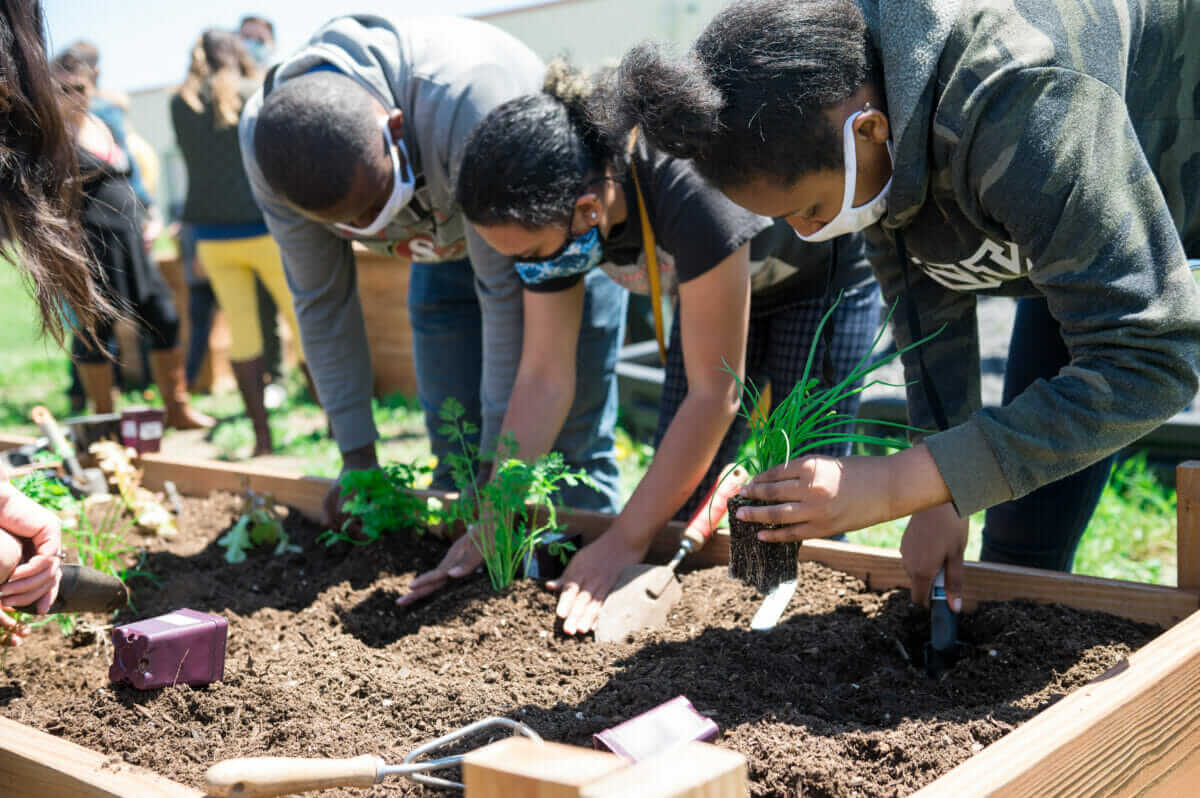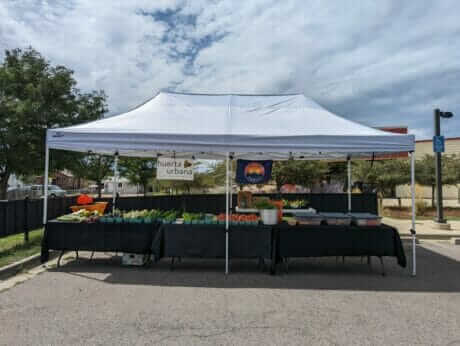This Earn-While-You-Learn Model is Transforming a Colorado Food Desert
Huerta Urbana’s community members learn about urban farming, while supplying their neighbors with fresh produce and gaining careers in the agriculture industry.
This Earn-While-You-Learn Model is Transforming a Colorado Food Desert
Huerta Urbana’s community members learn about urban farming, while supplying their neighbors with fresh produce and gaining careers in the agriculture industry.

Community classes bring people together at Huerta UrbanaCourtesy of Carrie Honaker
Denver’s Globeville and Elyria-Swansea neighborhoods have been designated food deserts, barren of grocery stores and affordable produce, for decades (a grocery store has been approved for the area, but has yet to open). In 2017, a co-op opened just outside of Globeville, but the organic, all-natural products remained too pricey for many community members. This was a community-wide problem, with many searching for a community-led solution. Enter: Huerta Urbana.
Launched in 2021, the 1.2-acre urban farm in downtown Denver, CO cultivates everything from basil to black-eyed peas, ensuring that community members have access to crucial food. Run by Focus Points Family Resource Center, Huerta Urbana is more than just a farmer’s market. It’s an agricultural education and entrepreneurship program, offering classes and opportunities for folks who want to work in the food space.
Participants receive training to manage a farm, pursue a career in something like environmental ag or even open their own farming business. “All participants earn while they learn,” says Matthew Vernon, chief of program operation. “Any time spent with the program is paid because the cost of childcare, transportation, rent and utilities add up. Even if you’re in a free program, you’re not making money to cover the bills at home.”

For Deisy Bustillos, Huerta Urbana offered an opportunity she, her mother Soledad and her sister Karen had been dreaming of since coming to Denver from Chihuahua, Mexico. Growing up, Bustillos and her sister felt the passion their mother had for gardening and fresh-cut flowers. They even had a hobby business buying flowers, creating arrangements and selling them on the side of the road for Valentine’s Day and Mother’s Day. But they didn’t have space to plant their own flowers in Denver and grow their project into a full-time business.
Serendipity struck in 2020. Bustillos’ mother helped with the community garden at Focus Points, and when they piloted the Huerta Urbana program, the three jumped on board.
Bustillos took every class offered, learning how to start a farm, cultivate different plants, take care of crops, harvest and then sell them. Now almost three years later, the ladies run S & D Creations. “We grow our own flowers, create arrangements and sell them at the farmers market. We also make jewelry and other crafts with dried flowers,” says Bustillos. “The program helped us tremendously with education about urban farming and providing seven raised beds for our flower farm.”
In addition to the education component, business funding and hands-on training Huerta Urbana provides, they also offer Veggie Valet, their version of a CSA. “It’s not just [our] produce—we purchase eggs, meat, meat alternatives, flour, masa, honey and beans from East Denver Food Hub (a social enterprise that supports small farms on the eastern plains); we also partner with two neighborhood bakeries impacted by the I-70 construction. It’s a way to support the vendors while providing fresh Colorado products to our customers,” says Vernon.
With little access to healthy food and produce, the community embraced Huerta Urbana, now an easy neighborhood walk away. “Foot traffic increased by 400 percent, pounds of produce distributed went up by 500 percent,” says Vernon. “That’s thousands of pounds of produce going out to hundreds of families on a weekly basis. We operate on a pay-what-you-can model and we’re the only farmers market in the Denver Metro region that accepts SNAP and WIC.”
Although produce represents the bulk of offerings, Huerta Urbana also has tables for businesses such as Compost Colorado, so folks have access to compostable hygienic products such as toothbrushes, laundry detergent and storage bags. Family Support Services register people for SNAP, WIC, utility systems and rental assistance. Dumb Friends League distributes gently used leashes, collars, toys and information on its next free spay and neuter clinic. The goal is to offer essentials in a single stop, without the shame or embarrassment that can sometimes come from need-based programs.
For Vernon, who has some personal history with not having what you need, eliminating shame was an important consideration. “There’s a sense of dignity that doesn’t always show up in resource offerings for families—you get in this line because you’re gonna use the token instead of regular money, and now everybody knows. We provide families with “market bucks” so everyone feels like they’re using the same currency.” This model allows customers to participate fully, and Focus Points reimburses vendors for any difference between what they collect and the market rate for their products.
Any given Friday wandering around Huerta Urbana, you can hear three or four different languages being spoken as produce flies everywhere. Children gather for storytime with Denver Public library, the smell of fresh tamales and tacos fills the air and performance artists from Project Athena (a Colorado nonprofit that empowers women through art) sing, dance and paint. There are poetry readings and face painters. Although Vernon says Huerta started to address the inequities of food access during the pandemic, the space has evolved into a social hub. More than an urban farm, it’s a cultural exchange that strengthens the surrounding communities.
“[Living in] this neighborhood, being walking distance to Huerta, I see how much it has helped the community,” says Bustillos. “Neighbors don’t really know each other today, but Huerta is a place where we can socialize, meet each other’s families and support [one another].”
Follow us

This work is licensed under a Creative Commons Attribution-NoDerivatives 4.0 International License.
Want to republish a Modern Farmer story?
We are happy for Modern Farmer stories to be shared, and encourage you to republish our articles for your audience. When doing so, we ask that you follow these guidelines:
Please credit us and our writers
For the author byline, please use “Author Name, Modern Farmer.” At the top of our stories, if on the web, please include this text and link: “This story was originally published by Modern Farmer.”
Please make sure to include a link back to either our home page or the article URL.
At the bottom of the story, please include the following text:
“Modern Farmer is a nonprofit initiative dedicated to raising awareness and catalyzing action at the intersection of food, agriculture, and society. Read more at <link>Modern Farmer</link>.”
Use our widget
We’d like to be able to track our stories, so we ask that if you republish our content, you do so using our widget (located on the left hand side of the article). The HTML code has a built-in tracker that tells us the data and domain where the story was published, as well as view counts.
Check the image requirements
It’s your responsibility to confirm you're licensed to republish images in our articles. Some images, such as those from commercial providers, don't allow their images to be republished without permission or payment. Copyright terms are generally listed in the image caption and attribution. You are welcome to omit our images or substitute with your own. Charts and interactive graphics follow the same rules.
Don’t change too much. Or, ask us first.
Articles must be republished in their entirety. It’s okay to change references to time (“today” to “yesterday”) or location (“Iowa City, IA” to “here”). But please keep everything else the same.
If you feel strongly that a more material edit needs to be made, get in touch with us at [email protected]. We’re happy to discuss it with the original author, but we must have prior approval for changes before publication.
Special cases
Extracts. You may run the first few lines or paragraphs of the article and then say: “Read the full article at Modern Farmer” with a link back to the original article.
Quotes. You may quote authors provided you include a link back to the article URL.
Translations. These require writer approval. To inquire about translation of a Modern Farmer article, contact us at [email protected]
Signed consent / copyright release forms. These are not required, provided you are following these guidelines.
Print. Articles can be republished in print under these same rules, with the exception that you do not need to include the links.
Tag us
When sharing the story on social media, please tag us using the following: - Twitter (@ModFarm) - Facebook (@ModernFarmerMedia) - Instagram (@modfarm)
Use our content respectfully
Modern Farmer is a nonprofit and as such we share our content for free and in good faith in order to reach new audiences. Respectfully,
No selling ads against our stories. It’s okay to put our stories on pages with ads.
Don’t republish our material wholesale, or automatically; you need to select stories to be republished individually.
You have no rights to sell, license, syndicate, or otherwise represent yourself as the authorized owner of our material to any third parties. This means that you cannot actively publish or submit our work for syndication to third party platforms or apps like Apple News or Google News. We understand that publishers cannot fully control when certain third parties automatically summarize or crawl content from publishers’ own sites.
Keep in touch
We want to hear from you if you love Modern Farmer content, have a collaboration idea, or anything else to share. As a nonprofit outlet, we work in service of our community and are always open to comments, feedback, and ideas. Contact us at [email protected].by Carrie Honaker, Modern Farmer
December 30, 2022
Modern Farmer Weekly
Solutions Hub
Innovations, ideas and inspiration. Actionable solutions for a resilient food system.
ExploreExplore other topics
Share With Us
We want to hear from Modern Farmer readers who have thoughtful commentary, actionable solutions, or helpful ideas to share.
SubmitNecessary cookies are absolutely essential for the website to function properly. This category only includes cookies that ensures basic functionalities and security features of the website. These cookies do not store any personal information.
Any cookies that may not be particularly necessary for the website to function and are used specifically to collect user personal data via analytics, ads, other embedded contents are termed as non-necessary cookies.
Sounds great, needs to happen more places. Only concern would be re people stealing the produce.